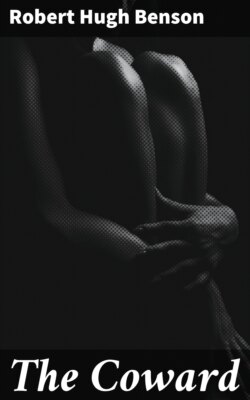Читать книгу The Coward - Robert Hugh Benson - Страница 13
На сайте Литреса книга снята с продажи.
(III)
ОглавлениеTable of Contents
It was really a bad day with Val. Boys of sixteen experience them sometimes, especially if their nervous centres are rather overstrung, and in such a state the faintest touch sets all a-jangle. He was so angry that he became completely and finally reassured as to his own courage. It seemed to him extraordinary that he had ever doubted it, and by noon he was almost determined to ride. But he saw this would never do, since it was conceded by all (as the theologians say), including himself, that the single reason for his not riding was his strained leg.
He spent the morning in a completely morbid manner, as his habit was at such times. He took a crutched stick, since his leg required it, and limped, even when he was entirely out of sight of the windows, out through the garden and into the woods. And there he sat down.
It was one of those breathless August days in which summer seems eternal and final. Every single, visible, living thing was at full stretch of its being. Over his head towered giant beeches, a world of greenery, with here and there a tiny patch of sky, blue and hot. About him was the bracken, every frond and vessel extended to bursting; beneath him the feathery moss. High up, somewhere in the motionless towers of leaf, meditated a wood-pigeon aloud, interrupting himself (as their manner is) as if startled at the beginning of a sentence. And the essence and significance of all was in the warm summer air—fragrant, translucent, a-sparkle with myriad lives, musical with ten thousand flies, as if a far-off pedal note began to speak.
Val had the vivid imagination which goes with such natures as his—an imagination that never grows weary of rehearsal; and in that realm, lulled externally by the perfect balance of life without him and within, leaning back at last on the bank as on a bed, with his hands clasped behind his head as usual, he began to construct the discomfiture of his brother.
His material, so to speak, consisted of two elements—Austin’s superiority, and Switzerland. He had caught on to the idea of climbing, and, as has been said, was convinced (as would be every wholesome boy of his age) that he would presently excel in this. It would be the one thing, he had determined, in which Austin would have to confess himself beaten. (He remembered, for his comfort, that Austin had once refused to follow him—some six years previously—along the ridged wall leading to the stable roof.)
Very well, then; that was settled.
Then he began to construct his scenes.
The earlier ones were almost vindictive. They represented Austin, a tiny figure, gazing up at him, pallid and apprehensive, as he rose swiftly in the air over the lip of an inconceivable precipice; Austin, with shaking hands, being pulled up by a rope, while he, Valentine, stood, detached and unperturbed, watching him from on high; Austin, collapsed and inert with terror, while he himself straddled, a second Napoleon, gazing out for succour from an inaccessible ledge. The final scene of the series was staged in the hotel dining-room, whose occupants rose to their feet and cheered as he, Valentine, with a stern, set face, strode in, with his paraphernalia jingling about him, after the conquest of a hitherto unclimbed peak.
He grew generous at last as he contemplated his future. Austin was no longer to collapse, but simply to remain mediocre, while bearded men, browned with sun and exposure, discussed the brilliant younger brother who had swept all before him. There was a final scene, which for an instant brought tears to his eyes and a lump to his throat, in which an explanation took place between the two: Austin, reverent and humble at last, was to grasp his hand and say that he had never understood or appreciated him; while he, magnanimous and conciliatory, was to remind the other that in lawn tennis, riding, and fencing—all manly sports—Austin was unquestionably the superior. (Gertie Marjoribanks, he settled parenthetically, was to be present at this interview.)
Indeed Val was not a fool. He had a nervous system, it must be remembered, and an imagination; and he was nearly seventeen years old.
